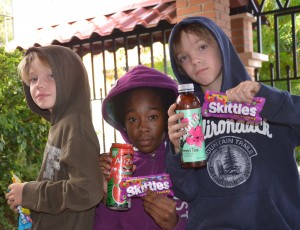On Monday, I told you about how our kids responded to Trayvon Martin’s death, choosing to take a picture in their hoodies. Today, I’ll share seven points we made with our kids as we talked about the case. As a head’s up, this is a long piece. But as I tell my kids when we are talking about something important, “Sorry, guys, but Mommy’s got a lot to say on this topic.”
1. We all have negative prejudices based on things that aren’t true. We may think that girls cannot be good at math. Or that foreigners are weird. Most people of all races tend to think negative things about people from other races. This is part of our broken nature. We need to ask God to help us identify those prejudices, and replace them with the truth.
We can’t know what was going on in George Zimmerman’s mind, but it seems likely that he had prejudices about black teenage boys. He called the police to report Trayvon as being suspicious, even when it seems as though Trayvon was doing absolutely nothing wrong.
2. Racism still exists. It did not end with slavery. It did not end with Martin Luther King. Racism is not over just because there is a black president or because Oprah and Lebron James make a boatload of money. This is because white people in our country still have more money and more political power than non-white people, and so our prejudices have bigger negative consequences than the prejudices of non-white people. Racism still exists in hiring practices, educational discipline practices, voting practices, entertainment industry practices, and everywhere that white people have more control. The institutions that govern and influence our country – police departments, judges, legislatures, banks, etc – are predominantly controlled by white people, so their prejudices can have a much more damaging effect than those of non-whites.
While it is likely that George Zimmerman’s prejudices led him to follow Trayvon in a neighborhood where he assumed Trayvon did not belong, it is the racism of the justice system that is most angering to most people about this case.
3. In our country, the justice system works differently for people based on race. We can’t say for certain why the police chief didn’t initially arrest George Zimmerman, but there is a long and continuing history in our country of black people being prosecuted at higher rates and getting harsher sentences for the same crimes as whites, and for people who commit crimes against black people being prosecuted at lower rates and receiving lighter sentences than people who commit crimes against whites.
(If you as a parent are unconvinced of this, you can read anything by the politically conservative, Evangelical Christian, Bill Stuntz. Until his death last year, he was perhaps the country’s best criminal procedure expert. Read an excerpt of his last book here, and a review here.)
When white people say things like, “Well, we don’t know what really happened,” it is a slap in the face to many of our black neighbors. Of course, we don’t know all the facts or the motives in any one person’s heart. Black people know this as well. But whites all too regularly say things like this about claims of racism by non-whites, and it hurts. And it’s not right. White people need to admit that the justice system, as a whole, does not work as well for black victims and black defendants as it does for whites.
4. It is harder for White people to see racism and injustice toward non-White people than it is for non-White people to see it. We don’t see it because we don’t have to, because it doesn’t effect our lives and the lives of our families in the same ways. Black people are far more likely to know the appalling statistics related to race and justice than whites are. This is part of why nearly all of the people you see at rallies and protests and prayer meetings for Trayvon are black. But just because it’s harder for us to see it, doesn’t mean that we are excused from seeing it. It’s our job to keep trying to listen to our black friends and black neighbors and black leaders. It’s our job to learn from people like Bill Stuntz, so that we are not ignorant of the truth about how racism and injustice effect our black neighbors’ lives today.
5. We live a great country. Our country, like every country on Earth, is broken, and sinful. When we see the glory of heaven, we will look back on our earthly home and see just how far astray our country was from God’s ideal. Racism and injustice are part of what is broken in our country.
Still, there is much that is right and wonderful here. You can be proud of being an American. One of the great things about America is that we have the ideal, if not always the practice, that all people are created equal, and that it’s important to work toward a fair society, where all people have a chance to pursue happiness. So when you fight for justice, for one person or a group of people, you are doing so on the shoulders of many who have come before you: people who fought against slavery; fought for women to be able to vote; fought for migrant farm workers to have decent working conditions; fought to allow students to proclaim their faith in public settings; fought to keep Japanese people out of the internment camps; and fought to give disabled people access to public buildings. Without courageous, primarily black, Americans fighting for Trayvon, I don’t think that George Zimmerman would be facing a trial right now.
Sometimes courageous Americans have lost those fights, but it is a noble tradition, nonetheless.
6. We serve an amazing God. Although people sometimes lose a righteous fight, and although our country will never be heaven, God never loses. In the darkness, his light never goes out. One day, he will redeem and restore all that is lost and broken. In the meantime, we do our best to hear his voice and follow his way. Often that means doing dangerous and unpopular things. We can do them, though, because God is our strength and our comfort.
He is with the oppressed, the weak, the brokenhearted. When we join hands with them, we join hands with God. We can walk arm in arm with our black brothers and sisters, knowing that God is there before us.
7. As a white child in a country still plagued by racism, you can do things to end racism and glorify God in the process. For example, you can read more history books about our country. You can work hard to make friends with people who are not like you in some way. You can write letters to our politicians. You can pray and ask God to help our country change.
You can’t bring Trayvon back to life, but in his honor, you can ask God to help you become someone he can use to help his will be done on Earth as it is in heaven.












